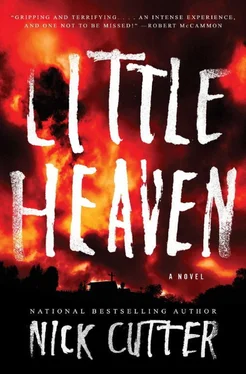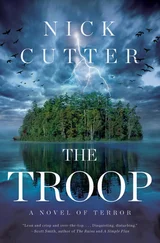“Any of them ever come out?” Ellen asked.
“Not that I ever saw.” The man flitted his tongue on the tip of his left canine tooth, one of the precious few teeth he had left. “Naw, there was the one. Had to leave on account of a bust leg.”
Micah said, “They seem dangerous to you?”
“Not so much that,” the man said. “They seem stupid. Whole idea of it. Who needs to slog into a forest to commune with God? There are perfectly good churches with roads leading to their front doors. It’s damn dangerous out there. Floods, forest fires, wild animals… all sorts of things.” An apathetic shrug. “Ain’t my job to talk folks out of being stupid.”
“What about the guy in charge?” Ellen asked. “You met him?”
“Not myself, no. Arnie Copps, local guy who owns the track machine, had dealings with him. Short-assed little fella. Wears his hair in a greased-up duck’s ass kept in place with about a pound of pomade. The horseflies got to love him, walking around with that grease trap on top of his head. But his people bend over backward for him. Gobble up every word that falls off his lips, I hear.”
“What’s the best way to get there?” Ellen asked.
“Why in the hell would you want to do that?”
When nobody answered, the man came around the counter and toed the screen door open.
“Follow this road,” he said, pointing. “Three miles you’ll hit a cut. Walk the dry wash a ways and you hit a trailhead. I don’t know the exact spot. I wouldn’t go on a bet.”
Ebenezer peeled the foil off a roll of cherry Life Savers and popped one into his mouth. “You prefer to worship in a civilized setting, I take it?”
“Something like that,” said the man. “You talk queer.”
“I speak the Queen’s English. I can’t imagine you hear it often.”
They stowed their supplies in the trunk and made ready their departure.
“You got something to shoot with?” the man asked. “A rifle? Scattergun?”
Micah said, “We might.”
“Yeah, you seem the type. Don’t know it’ll be much use against whatever’s up there, but better to have than not.”
Ellen said, “What do you mean by that?”
But the man had already turned his back on them. The screen door shut behind him. Flies—dozens of them suddenly—battered their bodies against the wire mesh. The din of their wings was disquieting.
THEY DROVE TO THE CUT.Gravel popped under the tires. Road grit drifted through the windows and clung to their skin. The townsfolk watched them from sagging front stoops or from behind dust-clad windows. Their faces were uniformly ravaged, jaundiced, and cored out just as the man’s at the shop had been.
It was only later that Micah would realize that he had not seen any boys or girls—no kids, and none of their harbingers. No playgrounds. No tricycles or kiddie pools in any of the weed-tangled yards.
Grinder’s Switch was a village of premature ancients. Not a single child.
THEY REACHEDthe cut the shopkeeper had spoken of. They parked the Olds and stretched their road-stiff limbs. They pulled on their Danner boots and organized their packs. They tightened the straps and made their way to the trailhead. Ellen walked in front. She had a bouncy stride. Micah followed Ellen with his eye—then he caught Minerva watching. Minny shook her head with a wry smile. Micah pressed his lips together and focused on the trees. They were scraggly at the base of the valley, clinging to the ribs of rock, but they got taller and shaggier as the valley rose into the hills.
“Pitter patter, tenderfeet,” said Ellen.
A trail was grooved through the dirt. It steadily ascended. They would have no trouble following it. They walked under a canopy of knit branches. The sunlight fell through the leaves and touched their skin, making it look as though their flesh had been dipped in a faint green dye.
“Didn’t that guy say something about a tank delivering supplies?” Minerva said. “Why not just follow this trail?”
“It could get a lot tougher,” said Ellen. “It might cross creeks and mudholes as it winds up into the hills—steep grades, rockslides, that kind of stuff.”
They hiked a few hours. The day grew warm under the trees.
“Hey,” said Minerva to Ellen. “What do you think would be the worst radioactive animal to get bitten by?”
“What?” said Ellen.
“You ever read Spider-Man ?” Minerva said. “Peter Parker got bit by a radioactive spider. He got all the powers of a spider. He can spin webs, climb buildings, he’s got a ‘spider sense.’ All in all, pretty good. But I got to thinking, what if he’d got bit by a dung beetle?”
“That doesn’t sound so hot,” Ellen said, laughing.
“You bet,” said Minerva. “Dung-Beetle-Man. He can roll boulder-sized rocks of shit up small hills! He can leap a pile of manure in a single bound!”
Ellen was laughing harder. “What about, I don’t know… Platypus-Man?”
“One day, on a research trip,” Minerva intoned, “a humble scientist, Peter Pancake, was bitten by a radioactive platypus. That day he became Platypus-Man! What can he do? Oh, he can open all sorts of tin cans with his bill! And…”
“Lay eggs?” said Ellen.
“Lay eggs in the soft sand! The world needs a hero, and now they have one—Platypus-Man!”
The women were laughing so hard now that they were having a tough time staying on the trail. Micah and Ebenezer bemusedly watched them.
“What about Tree-Sloth-Man?” Ebenezer ventured. “One day a radioactive sloth fell out of its tree and bit mild-mannered podiatrist Peter Porkchop and—”
“That’s stupid,” Minerva snapped acidly. “Why don’t you shut up? Nobody asked you.”
“This is what happens when you hire professional mercenaries to take you on a hiking junket,” Eb said to Ellen in a mild tone. “They are uncouth. They make things uncomfortable.”
Minerva said, “Go piss up a rope.”
“Example A,” Eb went on pleasantly. “Vulgar, yes? Barbaric, you might even say.”
From that point on, they hiked in silence. The land was dry—the crumbly, baked-earth aridness that would make firefighters pray for rain. Ebenezer aimed his rifle and obliterated a tumorlike toadstool growing on the trunk of a saw palmetto at two hundred yards. The crack of the gun pushed every other sound away, ushering in a thudding stillness.
“Simply checking the aim,” he said, reloading the rifle. “Every gun shoots a little different, as you know.”
Ebenezer and Micah were now breathing hard. The women fared better. Minerva’s strides carried her over gnarled roots and fallen logs. Ellen moved with preternatural grace. The men plodded behind them. A fungoid smell rose from the earth, which was spongy beneath a carpet of browned pine needles.
Minerva said, “What is that?”
She was looking at a hackberry tree. Something had been carved in its trunk. A symbol, a rune. It had been gouged deep into the wood.
Micah ran his fingers over the marking. The bark had not grown back; the pale heartwood was smooth as scar tissue. He had seen things like this in Korea. The enemy would score them on trees or rocks as warnings to passing soldiers. Sometimes an army translator had been able to decipher them and gain Micah’s unit a crucial advantage; other times not.
“A trail marker?” said Ellen. “Maybe someone hung their bear bag in the tree.”
“There’s one over here, too,” said Eb.
They discovered seven of these markings hacked into the surrounding trees. There might have been others farther back, only they hadn’t noticed. The markings were all roughly the same: a cross with a shorter line underneath the horizontal beam. It looked somewhat like a telephone pole. But what struck home was the intensity with which they had been laid into the wood: crude thudding chops that had torn out chunks of wood.
Читать дальше












